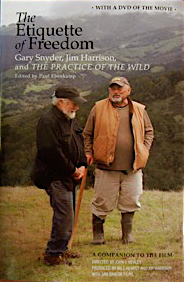Mar 23 2011
A Voice for the Wild
 I like to think of myself as a one-of-a-kind writer, whose quirky ideas are utterly new and different. But I too have my influences. Emerson and Thoreau are foremost among a hundred writers who have left their mark on me. Among my contemporaries Gary Snyder looms large, and for good reason. His book, The Practice of the Wild, came at a time when I was defining myself as a writer/thinker. When it comes to articulating the wild and our relationship to it, I am more indebted to him than I care to admit.
I like to think of myself as a one-of-a-kind writer, whose quirky ideas are utterly new and different. But I too have my influences. Emerson and Thoreau are foremost among a hundred writers who have left their mark on me. Among my contemporaries Gary Snyder looms large, and for good reason. His book, The Practice of the Wild, came at a time when I was defining myself as a writer/thinker. When it comes to articulating the wild and our relationship to it, I am more indebted to him than I care to admit.
Recently my wife gave me a copy of The Etiquette of Freedom as an early birthday present. This book is accompanied by a DVD that’s also called “The Practice of the Wild,” even though it’s a conversation between Gary Snyder and Jim Harrison on various subjects, along with a succinct portrayal of Snyder’s life and work. To those interested in Zen Buddhism, beat poetry and their influence on the counterculture of the 60s, this film is insightful. To those who want to better understand the roots of Environmentalism, it’s a must-see. But it struck me in a different way.
Snyder is 80 years old now. Even though he’s remarkably fit for his age, with a sharp mind to boot, it’s clear that the bulk of his work is behind him. We assume that our contemporaries will always be with us, and we eagerly await their next books, never considering the possibility that this flow of ideas might end. What happens when it does?
When I was a young man, I saw myself as God’s gift to the literary world. But every great book I’ve read since then has humbled me a bit. And I’ve read a lot of them through the years. Time marches on and those we idolize soon become history. This winter two of my favorite nature writers, John Hay and John Haines, passed away. The generation previous to my own is retiring, fading into the background, checking out. Can those in my generation fill their shoes? More to the point, can I be a voice for the wild the way someone like Snyder has been? My gut says no.
Snyder made it clear in the film that when he uses the word “nature” he means the entire universe, not just the outdoors. My sentiment exactly. And when he later said: “Life in the world is not just eating berries in the sunlight. I like to imagine a depth ecology that would go to the dark side of nature,” he was talking dirty to me. This is my domain – the wild that I have come to know firsthand. So maybe, just maybe, I have something to contribute to the conversation. That said I’m hoping he will write just one more book before, as he put it so eloquently, “walking the ghost trail in the stars.”
Comments Off on A Voice for the Wild

